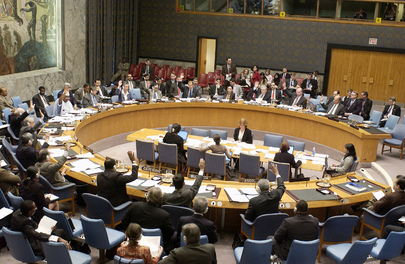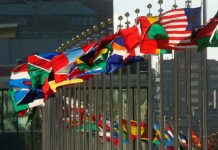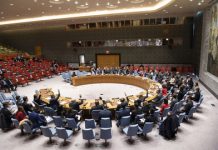UN News: You have said that that policymakers who signed off on aid cuts should come to Afghanistan to see the effect they’re having on the population. You said the effect of aid cuts is that millions die. Do you use this kind of blunt language when you’re talking to these policymakers in private?
Tom Fletcher: Yes, I do. Of course, there is a bit of a time lag before you really see the impact of the cuts, but here, 400 clinics closed in the last few weeks. That has a real-world impact and it’s become much more real for me on this trip.
I’ve just come from a meeting with NGOs, and they’re laying off half their staff. The local NGO’s that we’re keen to protect in the midst of all this, have been the hardest hit.
We try and find different ways to communicate this in slightly gentler terms, but ultimately, of course, people will die as a result of these cuts.
That’s the great tragedy at the heart of it now.
UN News: How do the politicians respond?
I think there are broadly two camps here. You’ve got politicians who are doing this really reluctantly, forced to make really tough decisions because their economies are struggling and because of pressures from taxpayers to do things differently. They know the importance of humanitarian efforts and they’re very sad about the choices they’re having to make.
Then there is another group of politicians who, I fear, celebrate, certainly in their public messages. They seem to boast about – and take credit for – aid cuts. That’s the group that I would love to bring to sit with a mother who has lost her child because she was forced to cycle pregnant to a hospital three hours away.
You show leadership on the world stage by being out there helping countries to deal with these challenges at source. I don’t know which of those arguments work with which constituencies, so we have to adapt and be creative in how we make the case.
We also have to be firm in defending what we do and take pride in the fact that the humanitarian community has taken millions out of poverty and saved hundreds of millions of lives.
UN News: You’ve become the UN emergency relief chief at a particularly tough time, in terms of ensuring the UN’s ability to help the most vulnerable. In February you announced 20 per cent cuts to your department. How will you make those cuts in a way that doesn’t make the job even harder?
The UN relief chief Tom Fletcher, visits a hospital in Kandahar, Afghanistan.
Tom Fletcher: It’s rough. Really brutal choices are being made and the sector will probably shrink by one third. The money that’s been cut isn’t going to come back anytime soon, and there may be more funding cuts ahead.
We will be looking for new partners, and trying to convince the sceptics to bring the private sector in and change the public conversation around solidarity. We have to work with the money that we have, not the money that we need or the money that we wish we had.
I’m really positive about the way that Marco Rubio, the US Secretary of State, has talked about the need to protect life-saving aid.
Dialogue is going on, I’m not giving up and I’m really positive about the way that Marco Rubio, the US Secretary of State, has talked about the need to protect life-saving aid. I really want to get into that conversation with him and see what his vision is for America’s role in saving lives around the world.
UN News: Given the current situation, are we going to have to completely rethink what aid entails and how it’s funded?
Tom Fletcher: We’re going to have to change. We have to preserve the best of what we’ve learnt and have confidence in what we’ve delivered so far, but we’re going through a process now that we call the “humanitarian reset”.
First of all, we’re becoming smaller and we’re trying to do that in a way that does as little damage as possible and minimises the hit to the essential life-saving work we do.
Alongside that, we’re becoming more efficient and smarter. I launched on my first day in office, a big efficiency drive across the sector.
The IASC, the body that coordinates our sector, has backed that up and actually taken it to the next level in terms of taking the layers out of the system and making sure we end the turf wars and focus on what we each do well, the extra value we bring, and ensure that we do much more at a local level, close to the communities we serve.
UN News: Do many Member States still believe in the importance of international aid?
Tom Fletcher: Absolutely. A number of donors are staying solid despite the funding crises that they’re all facing. We’ve got new donors emerging and growing. I’ve been in The Gulf, and I was in China last week, and engagement there is deepening.
We’ve got new donors emerging, and engagement is deepening
We’ve got more innovative ideas about how to bring in the private sector and also I believe really strongly in the role of individuals in finding ways to ensure that we’re reaching wider movement beyond governments and Member States.
UN News: Returning to Afghanistan, the de facto authorities [The Taliban] have severely reduced access to education and employment prospects for women and girls. Are you able to have a constructive discussion about this with the regime?
Tom Fletcher, the UN humanitarian meets women at an economic development programme in Afghanistan.
Tom Fletcher: Yes, we are. There are two really core issues here for us. One is the role of women in humanitarian work: we simply cannot deliver without them. They are brilliant, brilliant colleagues, we rely on them completely and we couldn’t be here without them.
And the second is the wider issue around rights for women and girls, including education and the fact that millions of girls have had that right stolen from them over the last three years.
These are difficult conversations, but I come at this as a former diplomat, as someone who believes in dialogue, who believes in respect and trust and listening, and in recognizing that we have different cultures, different traditions, different heritages and different beliefs that I don’t hold.
UN News: Before you began this job, did you have a goal in mind, that you want to achieve before the end of your mandate as the head of humanitarian affairs?
Tom Fletcher: The average head of OCHA lasts about three years, they burn through us pretty quickly. The travel schedule is very hectic and you’re dealing with the world’s worst crises so there’s a bit of wear and tear along the way.
It’s our job to save hundreds of millions of lives and to define everything we do against that yardstick.
So, my number one objective was to survive as long as possible, because I think it’s traumatic for an organization to get new people in, train them and have them up and running. Being around for a period of time, learning from the organization and from those we serve, and then putting that into action is a serious objective in itself.
I did come into it with an objective around the reform of the humanitarian sector, well before Donald Trump, Elon Musk and others started talking about efficiency and prioritization and cuts. I do believe that we can do this much more effectively and much closer to those we serve and so I was already determined to deliver that.
And then thirdly, the big one is ultimately about saving lives. I believe it’s our job to save hundreds of millions of lives and to define everything we do against that yardstick.
Source of original article: United Nations (news.un.org). Photo credit: UN. The content of this article does not necessarily reflect the views or opinion of Global Diaspora News (www.globaldiasporanews.net).
To submit your press release: (https://www.globaldiasporanews.com/pr).
To advertise on Global Diaspora News: (www.globaldiasporanews.com/ads).
Sign up to Global Diaspora News newsletter (https://www.globaldiasporanews.com/newsletter/) to start receiving updates and opportunities directly in your email inbox for free.































